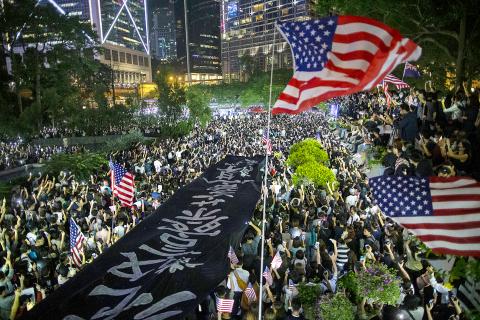Hong Kong Chief Executive Carrie Lam (林鄭月娥) yesterday said “it’s totally irresponsible and unfounded” to suggest that the territory is becoming a police state, as her government grapples with protests now in their fifth month.
In a spirited defense of Hong Kong’s 30,000-strong police force and her handling of the protests against criticism from visiting US senators, Lam challenged the notion that the territory is losing its freedoms, unique in China, as police battle demonstrators in the streets.
“I would challenge every politician to ask themselves if the large extent of violent acts, and all those petrol bombs and arson and deadly attacks on policemen, happened in their own country, what would they do? What would their policemen do?” Lam said. “So my simple response is: To describe Hong Kong as a police state is totally unfounded.”

Photo: Bloomberg
Critics have accused Lam’s government and the police of heavyhandedness, and some US lawmakers — including Senator Josh Hawley — are trying to pass legislation that would make Hong Kong’s special trading status subject to annual reviews of its political situation.
Hawley, a sponsor of the Hong Kong human rights and democracy act, had said during a weekend visit to the territory that it was “in danger of sliding towards a police state.”
The Missouri senator said he was standing by his statement.
“I chose the words ‘police state’ purposely — because that is exactly what Hong Kong is becoming. I saw it myself,” Hawley tweeted.
“If Carrie Lam wants to demonstrate otherwise, here’s an idea: resign,” he wrote.
Lam’s comments came as a Hong Kong court addressed one of the most startling cases of violence so far, involving an 18-year-old charged with intentional wounding for a slashing attack on a police officer on Sunday.
The court adjourned what would have been a first hearing for Hui Tim-lik (許添力), because the high-school student is still in a hospital in the wake of his arrest.
Police said the charge carries a possible sentence of up to life imprisonment.
The teen was initially detained on a preliminary charge of attempted murder.
Although not the first case during the protests of intentional wounding, the attack has attracted particular attention because it involved a sharp blade, described as a box cutter by Hong Kong media, and was caught on news media video.
Police said the riot control officer required surgery for the cut that severed a nerve.
The court adjourned the case to Friday or earlier if Hui is discharged from the hospital before then.
About a dozen friends, neighbors and supporters of the teen, some in black, which has become the color of protest in Hong Kong, were in court for the proceedings.

INVESTIGATION: The case is the latest instance of a DPP figure being implicated in an espionage network accused of allegedly leaking information to Chinese intelligence Democratic Progressive Party (DPP) member Ho Jen-chieh (何仁傑) was detained and held incommunicado yesterday on suspicion of spying for China during his tenure as assistant to then-minister of foreign affairs Joseph Wu (吳釗燮). The Taipei District Prosecutors’ Office said Ho was implicated during its investigation into alleged spying activities by former Presidential Office consultant Wu Shang-yu (吳尚雨). Prosecutors said there is reason to believe Ho breached the National Security Act (國家安全法) by leaking classified Ministry of Foreign Affairs information to Chinese intelligence. Following interrogation, prosecutors petitioned the Taipei District Court to detain Ho, citing concerns over potential collusion or tampering of evidence. The

NEGOTIATIONS: Taiwan has good relations with Washington and the outlook for the negotiations looks promising, Minister of Economic Affairs J.W. Kuo said Taiwan’s GDP growth this year is expected to decrease by 0.43 to 1.61 percentage points due to the effects of US tariffs, National Development Council (NDC) Minister Paul Liu (劉鏡清) said at a meeting of the legislature’s Economics Committee in Taipei yesterday, citing a preliminary estimate by a private research institution. Taiwan’s economy would be significantly affected by the 32 percent “reciprocal” tariffs slapped by the US, which took effect yesterday, Liu said, adding that GDP growth could fall below 3 percent and potentially even dip below 2 percent to 1.53 percent this year. The council has commissioned another institution

NEGOTIATIONS: The US response to the countermeasures and plans Taiwan presented has been positive, including boosting procurement and investment, the president said Taiwan is included in the first group for trade negotiations with the US, President William Lai (賴清德) said yesterday, as he seeks to shield Taiwanese exporters from a 32 percent tariff. In Washington, US Trade Representative Jamieson Greer said in an interview on Fox News on Thursday that he would speak to his Taiwanese and Israeli counterparts yesterday about tariffs after holding a long discussion with the Vietnamese earlier. US President Donald Trump on Wednesday postponed punishing levies on multiple trade partners, including Taiwan, for three months after trillions of US dollars were wiped off global markets. He has maintained a 10 percent

TRADE: The premier pledged safeguards on ‘Made in Taiwan’ labeling, anti-dumping measures and stricter export controls to strengthen its position in trade talks Products labeled “made in Taiwan” must be genuinely made in Taiwan, Premier Cho Jung-tai (卓榮泰) said yesterday, vowing to enforce strict safeguards against “origin laundering” and initiate anti-dumping investigations to prevent China dumping its products in Taiwan. Cho made the remarks in a discussion session with representatives from industries in Kaohsiung. In response to the US government’s recent announcement of “reciprocal” tariffs on its trading partners, President William Lai (賴清德) and Cho last week began a series of consultations with industry leaders nationwide to gather feedback and address concerns. Taiwanese and US officials held a videoconference on Friday evening to discuss the